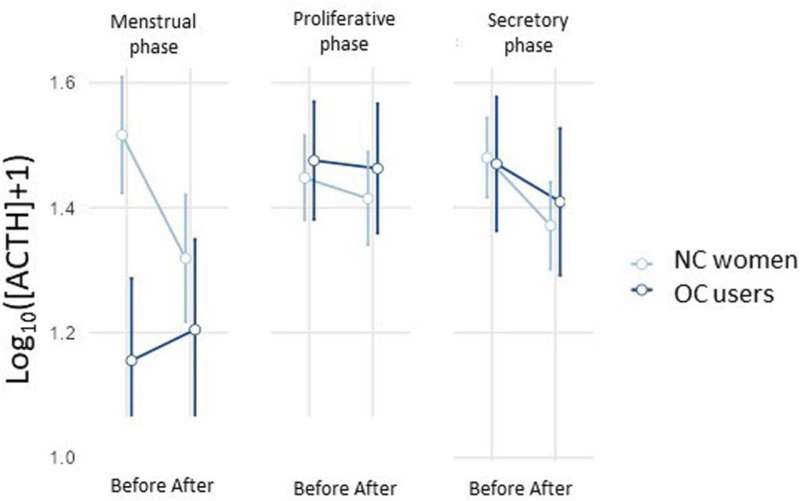This article has been reviewed according to Science X's editorial process and policies. Editors have highlighted the following attributes while ensuring the content's credibility:
fact-checked
peer-reviewed publication
trusted source
proofread
Study: Birth-control pills affect the body's ability to regulate stress

Women have used birth-control pills since the 1960s, but researchers still do not know everything about the body's complex reaction to the small, hormone-laden pill.
Researchers from Aarhus University and the United States have studied the stress response of 131 young women when having a blood sample taken. Some of the women were on birth-control pills, while others were not. The researchers specifically measured the levels of the stress hormone ACTH in the women's blood.
The study, now published in Behavioural Brain Research, showed that 15 minutes of social activity after having a blood sample taken lowers stress hormone levels in women who are not on the birth-control pill. In contrast, women who are on birth-control pills do not experience any reduction of their ACTH levels.
To avoid causing any additional stress to the test subjects, a small intravenous catheter was inserted in connection with the first blood sample. The researchers could then draw blood after the social activity without having to prick the women with a needle again.
Women played board games and sang songs together
The test subjects had an average age of 20.5 years. After having a blood sample taken, they could then participate in one of six different group activities such as playing board games, getting to know each other in a group session, singing songs together or attending a church service.
"Being with other people is one of the most effective ways of reducing stress. Our results are really important because they indicate that people who use birth-control pills do not experience the same reduced stress hormone levels in connection with social activity as people who do not use the pill," says Michael Winterdahl. He is a visiting scholar at the Translational Neuropsychiatry Unit at the Department of Clinical Medicine and is the last author of the article.
Several competing hypotheses
The study differs from previous studies that have primarily focused on the stress hormone cortisol in extreme circumstances. In this study, the researchers measured the stress hormone ACTH, which changes significantly faster than cortisol. This makes it possible to observe and analyze rapid changes in a person's stress response.
It has long been known that birth-control pills affect the stress response in women. However, looking at the stress hormone ACTH in connection with a social activity is a new approach.
"By studying ACTH levels, we take another step towards understanding how the brain regulates stress as ACTH acts as a neurotransmitter from the brain to the adrenal cortex, which produces cortisol. When we analyze ACTH levels, we can gain insight into the quick-response mechanism that controls the body's reaction to stress," says Michael Winterdahl.
Birth-control pills are known for being able to affect the hypothalamic-pituitary-adrenal (HPA) axis. As the name indicates, the stress signal travels from the hypothalamus in the brain through the pituitary gland, that releases ACTH, to the adrenal glands, that release cortisol.
The researchers still need a final explanation for why birth-control pill users do not experience the same reduction of stress hormone levels in connection with social activities as people who are not on the pill.
"There are several competing hypotheses that try to explain the lower cortisol levels in people who use birth-control pills. Our research has pushed us closer to an explanation that centers on the brain and the ACTH dynamics. The biochemistry is complex, but we are working based on the assumption that birth-control pills can suppress the body's own production of progesterone," says Michael Winterdahl.
Progesterone is broken down into the hormone allopregnanolone, which is involved in a wide range of calming effects and can have an influence on the stress response.
Differences between phases
The study involved women who used birth-control pills and women who didn't. The women were at different phases of their menstrual cycle.
The study revealed that the stress response in women who do not take birth-control pills depends on where they are in their monthly cycle. The stress-reducing group activities had no effect on the ACTH levels of the women who were in the proliferative phase of their cycle—just after their period has ended and the body begins producing hormones to get ovulation started.
"Progestrone levels are very low during the proliferative phase of a natural cycle. This leads to a minimal conversion of progestrone into the hormone allopregnanolone. Since allopregnanolone is important for activating the receptors that regulate the stress response, we don't see a reduction in ACTH levels in women with a natural cycle who have just had their period," says Michael Winterdahl.
He points out that women are also generally more physically active during the proliferative phase, and that could be seen as an adaption in which the stress response and behavior change in step with the cycle. In women who use birth-control pills, the stress response is 'disconnected', meaning it can not be adapted to a given situation.
Research still cannot explain exactly how this affects women. Additional research is therefore necessary to clarify the complex mechanisms involved in the correlation between hormone levels and the stress response.
"It's also relevant to point out that birth-control pills aren't just contraceptives. There are different generations of the pill, each with its own chemical structure due to the hormones used, which means the pills have different side-effect profiles. It's therefore crucial that our experiments are reproduced with a larger and more diverse group of test subjects," says Michael Winterdahl.
More information: Marie Vadstrup Pedersen et al, Adrenocorticotropic hormone secretion in response to anticipatory stress and venepuncture: The role of menstrual phase and oral contraceptive use, Behavioural Brain Research (2023). DOI: 10.1016/j.bbr.2023.114550





















